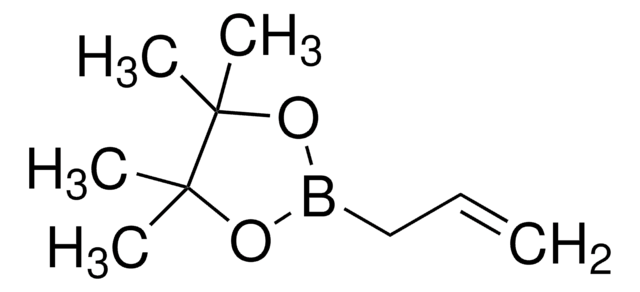694967
N-(2-Aminoethyl)-4-(trifluoromethyl)benzenesulfonamide
97%
Sign Into View Organizational & Contract Pricing
All Photos(1)
About This Item
Linear Formula:
CF3C6H4SO2NHCH2CH2NH2
CAS Number:
Molecular Weight:
268.26
MDL number:
UNSPSC Code:
12352100
PubChem Substance ID:
NACRES:
NA.22
Recommended Products
Assay
97%
form
solid
mp
111-115 °C
functional group
amine
fluoro
SMILES string
NCCNS(=O)(=O)c1ccc(cc1)C(F)(F)F
InChI
1S/C9H11F3N2O2S/c10-9(11,12)7-1-3-8(4-2-7)17(15,16)14-6-5-13/h1-4,14H,5-6,13H2
InChI key
HOVKSPHQQLXZON-UHFFFAOYSA-N
Application
N-(2-Aminoethyl)-4-(trifluoromethyl)benzenesulfonamide can be used as a ligand to synthesize half-sandwich Rh(III) complex, which is employed as a catalyst for the reduction of NAD+ to NADH by transfer hydrogenation using sodium formate as a hydride source. It is also used to form pentamethylcyclopentadienyl iridium (Cp*Ir)-diamine catalyst for selective transfer hydrogenation of various quinoxalines to synthesize corresponding tetrahydroquinxalines.
Signal Word
Warning
Hazard Statements
Precautionary Statements
Hazard Classifications
Acute Tox. 4 Oral - Eye Irrit. 2 - Skin Irrit. 2 - STOT SE 3
Target Organs
Respiratory system
Storage Class Code
11 - Combustible Solids
WGK
WGK 3
Flash Point(F)
Not applicable
Flash Point(C)
Not applicable
Personal Protective Equipment
dust mask type N95 (US), Eyeshields, Gloves
Choose from one of the most recent versions:
Certificates of Analysis (COA)
Lot/Batch Number
Don't see the Right Version?
If you require a particular version, you can look up a specific certificate by the Lot or Batch number.
Already Own This Product?
Find documentation for the products that you have recently purchased in the Document Library.
pH-regulated transfer hydrogenation of quinoxalines with a Cp* Ir-diamine catalyst in aqueous media
Tan J, et al.
Tetrahedron, 67(34), 6206-6213 (2011)
Joan J Soldevila-Barreda et al.
Journal of inorganic biochemistry, 153, 322-333 (2015-11-26)
Organometallic complexes have the potential to behave as catalytic drugs. We investigate here Rh(III) complexes of general formula [(Cp(x))Rh(N,N')(Cl)], where N,N' is ethylenediamine (en), 2,2'-bipyridine (bpy), 1,10-phenanthroline (phen) or N-(2-aminoethyl)-4-(trifluoromethyl)benzenesulfonamide (TfEn), and Cp(x) is pentamethylcyclopentadienyl (Cp*), 1-phenyl-2,3,4,5-tetramethylcyclopentadienyl (Cp(xPh)) or 1-biphenyl-2,3,4,5-tetramethyl
Our team of scientists has experience in all areas of research including Life Science, Material Science, Chemical Synthesis, Chromatography, Analytical and many others.
Contact Technical Service









